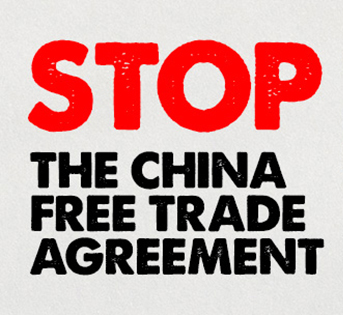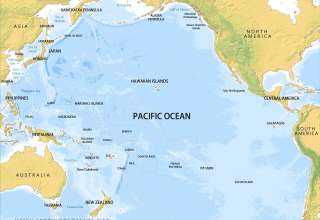This article is an Australian Fair Trade & Investment Network Media Release October 21, 2015
 “The deal reached by the ALP and the Coalition on the China FTA falls short of the recommendations of the ALP dissenting report for the Joint Standing Committee on Treaties published only two days ago,” Dr Patricia Ranald, Coordinator of the Australian Fair Trade and Investment Network said today.
“The deal reached by the ALP and the Coalition on the China FTA falls short of the recommendations of the ALP dissenting report for the Joint Standing Committee on Treaties published only two days ago,” Dr Patricia Ranald, Coordinator of the Australian Fair Trade and Investment Network said today.
“The ALP dissenting report recommended that the Migration Act be amended before the China FTA implementing legislation is passed to require that jobs for Investment FacilitationAgreements (IFAs) be advertised locally, that would raise the minimum rate of pay for temporary migrant workers, that would ensure skilled workers have the relevant license or registration within 60 days, and for improved resources for enforcement to prevent exploitation,” said Dr Ranald.
“The deal falls short of those recommendations. Instead of changes to the Migration Act, the deal involves changes only to the regulations of the Migration Act, but the draft regulations are not yet available for public scrutiny. It is claimed that the regulations will have the force of law, but regulations are much easier to change than legislation. It is not clear that there will be additional resources for enforcement, despite the many current examples of workers on temporary visas being exploited.”
“It is claimed that the regulations will include labour market testing for IFAs, raising the minimum rate of pay for temporary migrant workers to local market rates and ensuring that skilled workers have the relevant license or registration within 90 days, but without the details of the regulations we cannot know if this is the case,” said Dr Ranald
“There are other problems with the China FTA. It was concluded in haste, parts of it are unfinished and there has been no separate study of its impact on the economy as a whole. We remain opposed to the inclusion of investor rights to sue governments over domestic regulations, known as ISDS, the lack of improved regulation of quality and safety standards for imported food and other products, and note that there are no mention of commitments by China or Australia to enforceable workers’ rights and environmental protections similar to those in some other recent agreements. Overall, the agreement is not in the national interest,” said Dr Ranald




